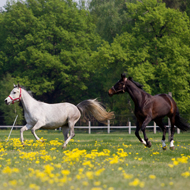Brazil should address donkey skin trade, says Donkey Sanctuary
The donkey population has dropped by 61 per cent in less than a decade.
The Donkey Sanctuary has called for Brazil to address its donkey skin trade as the country hosted this year's G20 summit.
The charity says that an estimated six million donkeys are killed each year to meet the growing demand for ejiao. Ejiao, a Chinese remedy, is made by extracting collagen from donkeys’ skins.
As a result of the global trade, Brazil’s donkey population has fallen 61 per cent in less than a decade.
The population dropped from 974,688 in 2011 to 376,874 in 2017. According to government data, a further 231,934 donkeys were then slaughtered between 2018 and 2023.
Researchers are particularly concerned about the loss of Brazil’s northeastern donkeys, following a recent discovery of a unique genome only found in this part of the world.
There are fears that, if the slaughter continues, the species and the genome could be lost forever.
In February 2024, a moratorium on the slaughter of donkeys for their skin was agreed by all member states of the African Union for at least the next 15 years. The Donkey Sanctuary is now calling for Brazil to implement its own legislation.
A bill to prevent donkey and horse slaughter has already passed the Agricultural and Environmental Commissions in Brazil’s Congress. It is now being considered by the Committee on Constitution, Justice and Citizenship.
It will then be taken to the Senate where, if it is agreed by the commission and sanctioned by Brazil’s president, it will become law.
The Donkey Sanctuary says that it is already supported by the Regional Council of Veterinary Medicine, as well as universities and farmers in Brazil. The charity considered the G20 summit, which was this year hosted by Rio de Janeiro, to be an opportunity for Brazil to address the issue.
Dr Patricia Tatemoto, campaign coordinator for The Donkey Sanctuary, said: “Brazil has an opportunity to show leadership, recognising the critical role donkeys play across South America and the Global South. Donkeys were once central to construction and agriculture across Brazil, and today still work alongside people living in remote regions.
“In fact researchers have discovered that Brazil’s northeastern donkey has a unique genome that only exists here. This important cultural and biological resource must be protected.”
Image © Shutterstock






 The latest
The latest 
